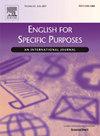Business English writing problems of business English majors: A triangulated approach
IF 2.7
1区 文学
Q1 LINGUISTICS
引用次数: 0
Abstract
In universities or colleges that offer Business English undergraduate programs, Business English writing is taught as a compulsory course designed to equip Business English majors with workplace-ready writing skills. However, their Business English writing competence still fails to meet the workplace-specific requirements. While prior research has identified several problems in students' writing, very few have adopted a mixed-methods approach or systematically applied theoretical models to identify and analyze Business English writing problems. Addressing this gap, this study employed a triangulated approach, using multiple instruments including questionnaires, semi-structured interviews, and students' business letters, to examine Business English majors' Business English writing problems. The findings showed that students' problems are mainly in business knowledge, intercultural competence, sociolinguistic competence, grammar, vocabulary, and mechanics. This study contributes to the Business English writing pedagogy by highlighting Business English majors’ writing problems to promote autonomous learning, urging teachers to transcend conventional language pedagogy, and advocating for syllabus adaptation such as expanding teaching hours and offering prerequisite courses in business fundamentals and intercultural communication.
商务英语专业学生的商务英语写作问题:三角法
在提供商务英语本科课程的大学或学院中,商务英语写作是一门必修课,旨在使商务英语专业的学生掌握职场写作技巧。然而,他们的商务英语写作能力仍然不能满足工作场所的具体要求。虽然之前的研究已经发现了学生写作中的一些问题,但很少有人采用混合方法或系统地应用理论模型来识别和分析商务英语写作问题。为了解决这一差距,本研究采用三角法,使用多种工具,包括问卷调查、半结构化访谈和学生的商务信函,来调查商务英语专业学生的商务英语写作问题。调查结果显示,学生的问题主要集中在商务知识、跨文化能力、社会语言能力、语法、词汇和机械方面。本研究通过突出商务英语专业学生的写作问题,促进自主学习,敦促教师超越传统的语言教学,倡导教学大纲的调整,如扩大教学时数,开设商业基础和跨文化交际的先决课程,为商务英语写作教学法做出贡献。
本文章由计算机程序翻译,如有差异,请以英文原文为准。
求助全文
约1分钟内获得全文
求助全文
来源期刊

English for Specific Purposes
LINGUISTICS-
CiteScore
5.70
自引率
8.00%
发文量
41
审稿时长
62 days
期刊介绍:
English For Specific Purposes is an international peer-reviewed journal that welcomes submissions from across the world. Authors are encouraged to submit articles and research/discussion notes on topics relevant to the teaching and learning of discourse for specific communities: academic, occupational, or otherwise specialized. Topics such as the following may be treated from the perspective of English for specific purposes: second language acquisition in specialized contexts, needs assessment, curriculum development and evaluation, materials preparation, discourse analysis, descriptions of specialized varieties of English.
 求助内容:
求助内容: 应助结果提醒方式:
应助结果提醒方式:


